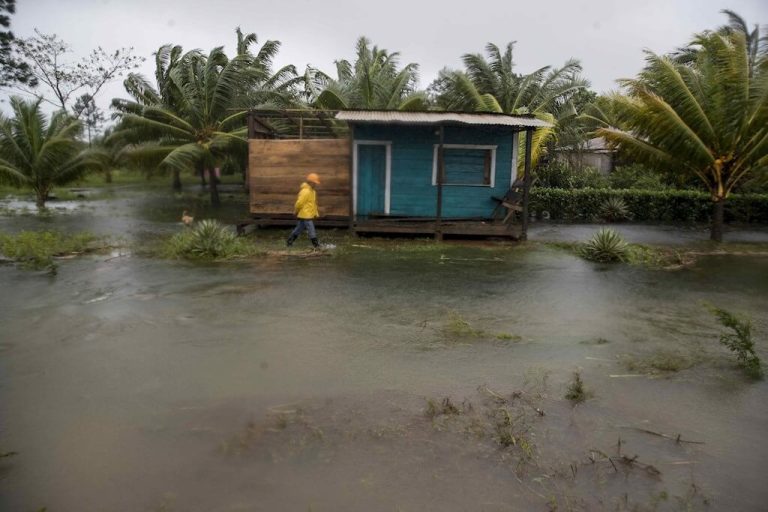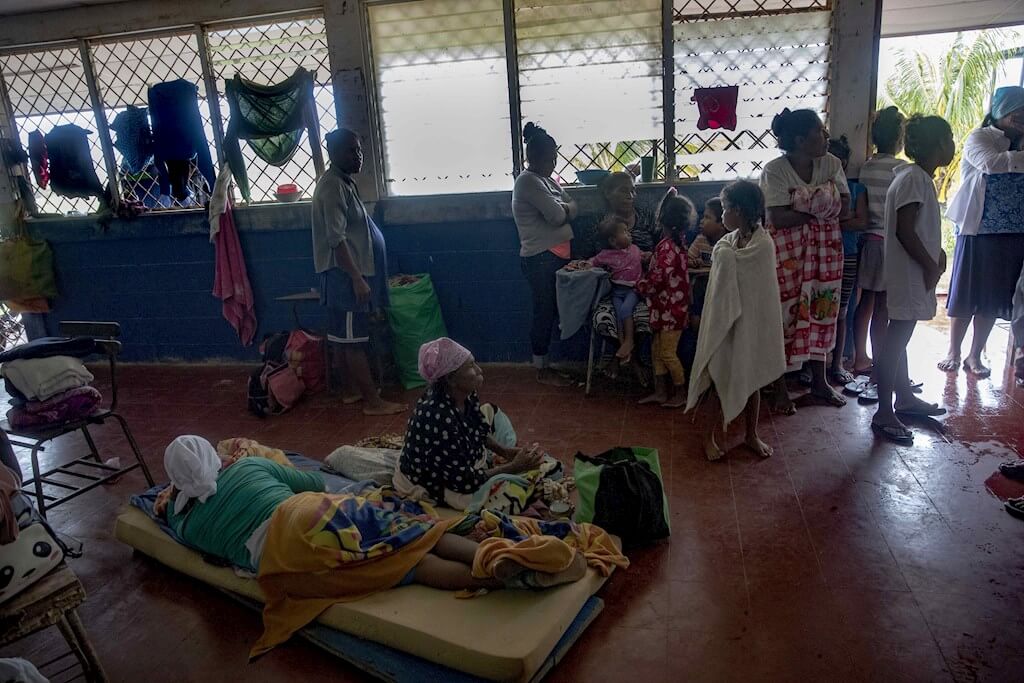9 de noviembre 2020

Children of Exile: The Births “Sowing Hope” in the Camp of Nicaraguan Farmers

PUBLICIDAD 1M
PUBLICIDAD 4D
PUBLICIDAD 5D
Today's news report: the aftermath of Hurricane ETA in Nicaragua, the persecution of solidarity of ETA victims, and the upcoming "electoral reforms"

A man walks in front of his flooded house, in the community Pista 43, during the arrival of hurricane ETA on November 4, 2020, on the north Caribbean coast in Bilwi (Nicaragua). Photo: EFE/Jorge Torres
The impact of Hurricane ETA, which made landfall in the North Caribbean of Nicaragua as a category 4 phenomenon, caused rivers to overflow, flooding of homes, and the evacuation of thousands of people from the affected areas. The aftermath of rains and winds left by ETA, like a storm and tropical depression, also caused havoc in the Northern part of the country.
According to sources from the National System for the Prevention, Mitigation and Attention of Disasters (SINAPRED) the pier in the city of Bilwi - the capital of the North Caribbean Coast Autonomous Region (RAAN) - was partially destroyed and the Prinzapolka river overflowed, causing the flooding of dozens of houses.
To date, the Ortega-Murillo regime has not presented an official balance on the effects of the hurricane, and they have refused to recognize the deaths of two artisanal miners as the result of the rains in Siuna among the ETA victims.
The Pan American Health Organization warned that, if the corresponding prevention measures are not taken, the impact of ETA will generate conditions for the spread of Covid-19.
ETA has left a trail of destruction in Central America, first as a hurricane and then as a tropical storm and tropical depression, with a preliminary estimate of twenty deaths, more than a dozen of them in Honduras, where the rains left hundreds of houses completely flooded.
It is estimated that more than 30,000 people were evacuated, but there is no official number of victims. In shelters set up in churches and schools, the population complained about the lack of food, water, electricity, sleeping mats, and clothing.
Read an article on the matter (in English) here.

Photograph of people in a shelter in the community Pista 43 during the passage of hurricane ETA, on November 4, 2020, on the north Caribbean coast in Bilwi (Nicaragua). Foto: EFE/Jorge Torres
In the face of the clamor for help from those affected by hurricane ETA, the regime of Daniel Ortega ordered the National Police to stay at the entrances of dozens of collection centers set up in various cities of the country to collect humanitarian aid.
The regime’s repressive forces closed the premises of collection centers and forced the organized people to desist from continuing to call for solidarity. Some were also ordered to delete messages on social media.
Civil initiatives as well as those that emerged from the business sector, such as the INDE, the Network of Business Women, the Chamber of Tourism, and others of the Nicaraguan Medical Unit were besieged by the National Police.
Read the full report (in English) here.

Photo: Confidencial
President Daniel Ortega ordered a group of FSLN deputies and magistrates to design a draft reform to the Electoral Law, which will focus strictly on aspects of a “technical nature”, as was revealed to CONFIDENCIAL by a source linked to the Sandinista Front.
Ortega and Rosario Murillo, his wife and Vice President of the country, gave guidance on the development of the project which excludes changes in the Supreme Electoral Council as well as national and international electoral observation.
According to the FSLN source, the changes directed by Ortega are limited to technical aspects of the Electoral Law, such as, for example, the electoral roll, the composition of the Vote Receiving Boards, and the role of prosecutors. However, the 12 proposals of the Electoral Reform Promotion Group, which gathers the national consensus to guarantee conditions for free, fair, and transparent elections, would be set aside.
Opponents and members of the Group Pro Electoral Reforms responded in rejection of the proposal. The political scientist José Antonio Peraza, a member of the group that presented a consensual electoral reform in September, told CONFIDENCIAL that "if there is no convincing reform here, then there will be no elections because no one is going to go to elections in these conditions".
Read the full report (in Spanish) here.
The Inter-American Commission on Human Rights (IACHR) granted precautionary measures to 41 political prisoners that remain in the prisoners of the Daniel Ortega regime, considering that they are in a grave and urgent situation of irreparable damage to their rights.
The IACHR also granted the same measures to Juana de la Rosa Lesage Guadamuz and Roberto José Esteban, parents of the three Lesage brothers, released in May 2019.
The agency detailed that the risk for opponents deprived of liberty is related to the conditions of their detention and the lack of medical attention in the context of the coronavirus pandemic.
Read the full report (in Spanish) here.
Liberal and Orteguista deputies of the Special Constitutional Commission dictated in favor of the proposed reform to article 37 of the Political Constitution, which will establish life imprisonment, for alleged "hate crimes", according to the regime of Daniel Ortega and Rosario Murillo.
Read the full report (in Spanish) here.
This article has been translated by Ana Maria Sampson, a Communication Science student at the University of Amsterdam and member of our staff*
PUBLICIDAD 3M
Confidencial es un diario digital nicaragüense, de formato multimedia, fundado por Carlos F. Chamorro en junio de 1996. Inició como un semanario impreso y hoy es un medio de referencia regional con información, análisis, entrevistas, perfiles, reportajes e investigaciones sobre Nicaragua, informando desde el exilio por la persecución política de la dictadura de Daniel Ortega y Rosario Murillo.
PUBLICIDAD 3D